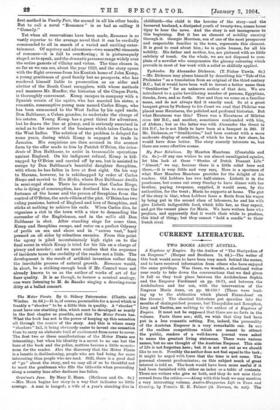C URRENT LITERAT URE.
A Keystone of Empire. By the Author of "The Martyrdom of an Empress." (Harper and Brothers. 7s. 6d.)—The writer of this book would seem to have been very much behind the scenes, and to have received information from others who have enjoyed the same privilege. Was there, we wonder, a shorthand writer near ready to take down the conversations that we find given in full as they took place between the Archduchess Sophia and the Emperor Ferdinand on pp. 58-71, and between the Archduchess and her son, with the intervention of the Empress Maria Anna, ' on pp. 93-110 ? (These were lead- ing up to the abdication which placed Franz-Josef on the throne.) The classical historians put speeches into the mouths of distinguished persons, but Thucydides and Xenophon, Livy and Tacitus, are nothing to the author of A Keystone of Empire. It must not be supposed that there are no facts in the volume. Facts there are ; still, we wish that they had been put in a less romantic setting. For, indeed, the personality of the Austrian Emperor is a very remarkable one. In me of the endless competitions which are meant to attract the public, readers of a well-known journal were asked to name the greatest living statesman. There were various names, but no one thought of the Austrian Emperor. This side of life is not forgotten here ; but it is not set out as we should like to see it. Possibly the author does not feel equal to the task ; it might be urged with force that the time is not come. The personal element predominates; on this subject much of great interest is told us. The•book would have been more useful if it had been furnished with either an index or a table of contents. There are writers who give us both, and they do not miss their reward from the critics.—Along with this book we may mention a very interesting volume, Austro-Hungarian Life in Town and Country, by Francis H. E. Palmer (G. Newnes, 3s. net). The chief subject is, of course, the social life of the people—we should rather say, the peoples—which go to make up that very complex entity, the Austrian Empire. Incidentally it illustrates in a very striking way the difficulties of the Emperor's position. Never had a charioteer such a team to drive! One of the many perplexities is the want of a really satisfactory ruling class. Let any one read what Mr. Palmer has to say on this topic, and he will see what is meant. But anomalies of every kind abound in this strange microcosm. What would be said anywhere else of a Roman Catholic priest arranging with a Protestant schoolmaster that the latter should instruct boys and girls preparing for their first Communion















































 Previous page
Previous page